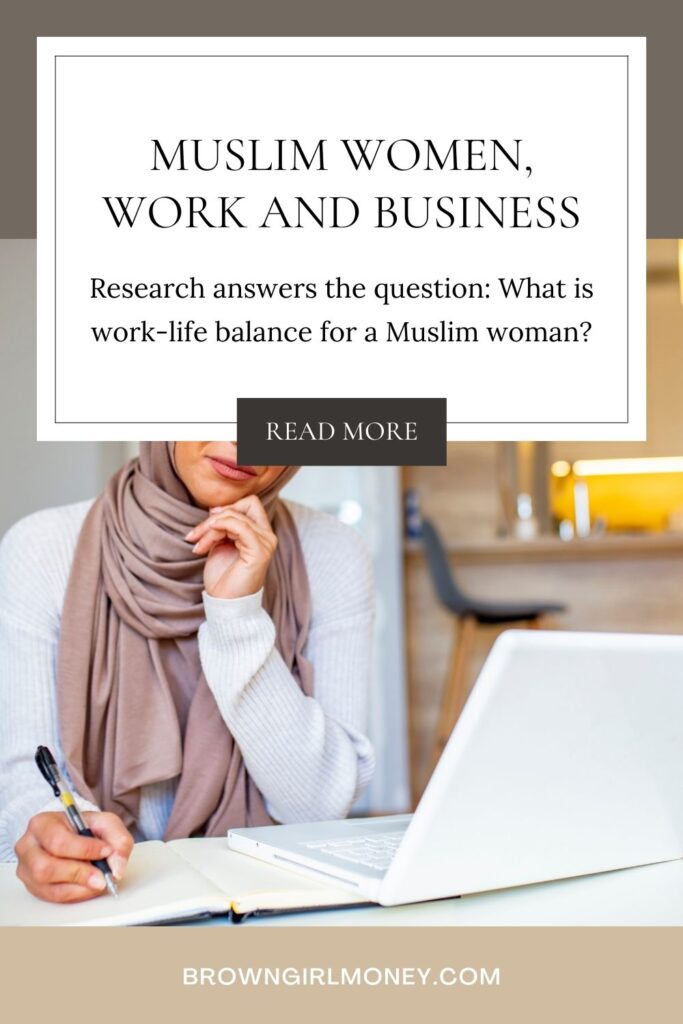Muslim Women, Work & Business: Research That Will Shock You
March 17, 2018
TLDR: Muslim women are one of the lowest, most disadvantaged groups when it comes to work and employment. This is despite them being well educated, skilled and willing to work – in fact, most express a desire to earn their own money. Most Muslim women want a career that allows them to put their family and children first. A business that they’re passionate about, which allows them to work from home and choose their own hour is the best balance in my eyes.
If there’s one thing I’m passionate about, it’s helping women of colour change the trajectory of their lives through their finances. I have first-hand witnessed how empowering it is for a WoC to take control of her income and how much of a positive impact this has on everything from her mental health to her quality of life.
But unfortunately, WoC do not have it easy when it comes to money. WoC are one of the most marginalised, disadvantaged groups when it comes to work. Specifically, Muslim women are the largest group in the UK who report themselves as ‘not working’.
When we dive a bit deeper into why British Muslim women are so underrepresented in work, it shares a saddening tale.
Muslim women ARE ambitious and DO want to work
You’d perhaps think if the statistics are showing us Muslim women aren’t in work, it must mean they don’t want to work, right?. But the statistics show that is so incredibly far from the truth! The reality is that 93% of Muslim women out of work state they do want to be working. We need to dig deeper to understand the reason behind this discrepancy.
Saddeningly, there is a huge discrepancy between what Muslim women aspired to become and what they were able to access, as well. In one study, it was found that only 1.3% of Muslim girls who wanted to pursue a medical career were able to successfully do so. This was was also the case for 18% of girls aiming for a career in journalism and media, and 26% for law. This shows us a saddening gap between what Muslim women want to achieve, and what they are able to.
So what happens between that point in secondary school, where so many girls foster ambitious goals, and adulthood? What is the reason behind so many Muslim women being unable to achieve their aspirations?

Muslim women experience much greater barriers to work than other groups
The truth is, it’s not a level playing ground for Muslim women. We have far more obstacles in the way than other groups which make it harder for us to earn an income.
A study looking into reasons why Muslim women have lower rates of employment found the following barriers played a big part in keeping them economically inactive:
- Lack of information of resources (reported by 32% of participants in the study)
- Discrimination (29.6%)
- Family expectations (28.7%)
- Islamophobia (17.6%)
- Health (12%)
- Partner expectations (5.2%)
- Disability (4%)
- Other personal circumstances (19.3%)
- 78% experienced more than one barrier, serving to show just how many barriers Muslim women face.
Discrimination in work and education
If you are a Muslim woman, or a woman of colour from any religious background, you will very likely know the reality of discrimination. 65% of women report feeling discriminated against because of their clothing, including their hijabs, their faith or the colour of their skin. 47% report Islamophobia is a challenge at their workplace.
Family expectations
Many Muslim women will carry the heavy burden of cultural expectations when it comes to family life. Although Islam does not prevent a woman from working (it supports it, actually), many times women feel pressurised to always put their family and husband first, at the expense of their own personal and career development. 34% of Muslim women state that expectations from their family or partners were major barriers to their career development.
If a woman lives with extended family, as is common in many South Asian households, this may inevitably be more of a problem. The older generation of British Muslims are more ‘traditional’ and ‘conservative’ in regards to women working, which can hold back many women afraid of conflict at home, or they could be responsible for the care of their elderly relatives. In one study involving a focus group, all of the working Muslim women interviewed spoke of how going to work was a mammoth task, as many lived with their in-laws and struggled with tasks such as childcare, running the house and caring for elderly family members.
Muslim women are less likely to access formal childcare
Childcare is a universal issue for British parents, but interestingly the research shows us Muslim women have a strong preference for ‘taking time out’ from work to have and raise their children. 47% of Muslim women report they left work to have children.
One study found that 72% of Muslim women said they would not like to access formal childcare for their children, which included wrap-around care and pre-school provisions. A lot of these women have this preference due to religious and cultural reasons. These statistics show us that for Muslim women, having children is a major turning point in their lives which has a huge impact on their careers.

So, what is work/life balance for a Muslim woman?
What would be the optimal conditions which would encourage Muslim women to become economically active and financially independent?
A survey asked 1,000 British Muslim woman ‘What does success mean to you?’. The overwhelming response? 32% said to them it meant successfully combining family life with work. 26% said being happily married and a good mother meant success for them, again indicating family life is at the forefront of their minds.
It’s very clear to see that any kind of work setting would need to allow Muslim women the flexibility and freedom to put their families first. Ideally, this arrangement would be a work from home setting (74% agreed with this).
The best solution for Muslim women: My take
Having seen both sides – being employed with an amazing career ahead of me, and running my own business – there is no comparison. Starting my own business has been the best decision I could have ever made for myself, especially now that I’m a mother. I am earning far more than I could have ever done working for someone else, whilst working just a few hours a week from home AND I spend most of my time with my family, doing the things I love and prioritising my own health and hobbies.
Helping WoC realise their potential and helping them succeed is something I’ve grown to become incredibly passionate about. I want you to realise your true potential, and I want you to go out there and unapologetically succeed in ways you never thought possible. I will always advocate for WoC to start their own businesses, learn how to operate them and thrive financially, without the burn-out, difficult work environments and definitely without a ceiling of income.
Muslim women, if you’re looking for work-life balance but feel like that’s impossible for you, you need to start a business. And Brown Girl Money is here to help you with that.
If you want to start a side hustle but need a boost in confidence, skills and know-how, I’d love to help you achieve financial independence by building a smart, strategic business. This passion has led me to creating a whole community of like-minded, ambitious, hardworking women who share this same goal.
You can join this community by signing up to the Brown Girl Money email newsletter here (as well as getting my FREE Money Mastery Toolkit!) and by following me on Instagram here. I’d love to see you there!

- The Complete Budgeting/ Financial Planning Toolkit
- The Ultimate 9-5 Escape Plan: How to Quit Your Job in 6 months
- Top 20 Side Hustle Ideas to Make £500 Per Month
- Investing Made Easy: Your 5 Step Guide to Start Investing Today
Get Your Money Mastery Toolkit
Snag £198 worth of bonuses completely free
You're all signed up!
Be sure to whitelist our email address so that all the goodies make it to your inbox.